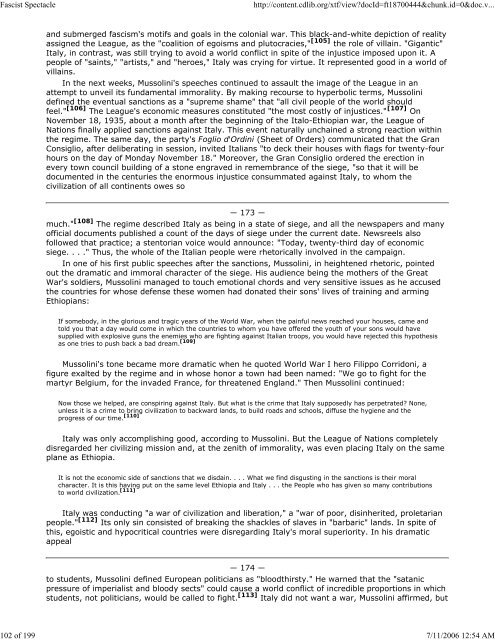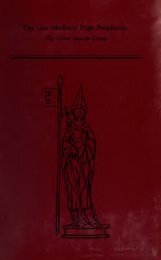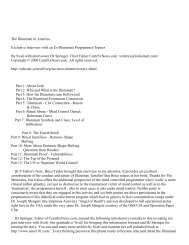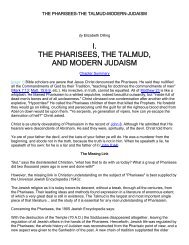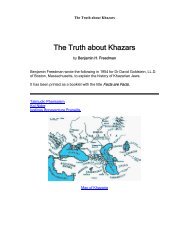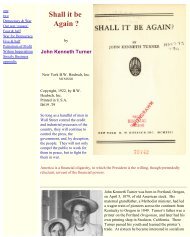You also want an ePaper? Increase the reach of your titles
YUMPU automatically turns print PDFs into web optimized ePapers that Google loves.
<strong>Fascist</strong> <strong>Spectacle</strong> http://content.cdlib.org/xtf/view?docId=ft18700444&chunk.id=0&doc.v...<br />
and submerged fascism's motifs and goals in the colonial war. This black-and-white depiction of reality<br />
assigned the League, as the "coalition of egoisms and plutocracies," [105] the role of villain. "Gigantic"<br />
Italy, in contrast, was still trying to avoid a world conflict in spite of the injustice imposed upon it. A<br />
people of "saints," "artists," and "heroes," Italy was crying for virtue. It represented good in a world of<br />
villains.<br />
In the next weeks, Mussolini's speeches continued to assault the image of the League in an<br />
attempt to unveil its fundamental immorality. By making recourse to hyperbolic terms, Mussolini<br />
defined the eventual sanctions as a "supreme shame" that "all civil people of the world should<br />
feel." [106] The League's economic measures constituted "the most costly of injustices." [107] On<br />
November 18, 1935, about a month after the beginning of the Italo-Ethiopian war, the League of<br />
Nations finally applied sanctions against Italy. This event naturally unchained a strong reaction within<br />
the regime. The same day, the party's Foglio d'Ordini (Sheet of Orders) communicated that the Gran<br />
Consiglio, after deliberating in session, invited Italians "to deck their houses with flags for twenty-four<br />
hours on the day of Monday November 18." Moreover, the Gran Consiglio ordered the erection in<br />
every town council building of a stone engraved in remembrance of the siege, "so that it will be<br />
documented in the centuries the enormous injustice consummated against Italy, to whom the<br />
civilization of all continents owes so<br />
― 173 ―<br />
much." [108] The regime described Italy as being in a state of siege, and all the newspapers and many<br />
official documents published a count of the days of siege under the current date. Newsreels also<br />
followed that practice; a stentorian voice would announce: "Today, twenty-third day of economic<br />
siege. . . ." Thus, the whole of the Italian people were rhetorically involved in the campaign.<br />
In one of his first public speeches after the sanctions, Mussolini, in heightened rhetoric, pointed<br />
out the dramatic and immoral character of the siege. His audience being the mothers of the Great<br />
War's soldiers, Mussolini managed to touch emotional chords and very sensitive issues as he accused<br />
the countries for whose defense these women had donated their sons' lives of training and arming<br />
Ethiopians:<br />
If somebody, in the glorious and tragic years of the World War, when the painful news reached your houses, came and<br />
told you that a day would come in which the countries to whom you have offered the youth of your sons would have<br />
supplied with explosive guns the enemies who are fighting against Italian troops, you would have rejected this hypothesis<br />
as one tries to push back a bad dream. [109]<br />
Mussolini's tone became more dramatic when he quoted World War I hero Filippo Corridoni, a<br />
figure exalted by the regime and in whose honor a town had been named: "We go to fight for the<br />
martyr Belgium, for the invaded France, for threatened England." Then Mussolini continued:<br />
Now those we helped, are conspiring against Italy. But what is the crime that Italy supposedly has perpetrated? None,<br />
unless it is a crime to bring civilization to backward lands, to build roads and schools, diffuse the hygiene and the<br />
progress of our time. [110]<br />
Italy was only accomplishing good, according to Mussolini. But the League of Nations completely<br />
disregarded her civilizing mission and, at the zenith of immorality, was even placing Italy on the same<br />
plane as Ethiopia.<br />
It is not the economic side of sanctions that we disdain. . . . What we find disgusting in the sanctions is their moral<br />
character. It is this having put on the same level Ethiopia and Italy . . . the People who has given so many contributions<br />
to world civilization. [111]<br />
Italy was conducting "a war of civilization and liberation," a "war of poor, disinherited, proletarian<br />
people." [112] Its only sin consisted of breaking the shackles of slaves in "barbaric" lands. In spite of<br />
this, egoistic and hypocritical countries were disregarding Italy's moral superiority. In his dramatic<br />
appeal<br />
― 174 ―<br />
to students, Mussolini defined European politicians as "bloodthirsty." He warned that the "satanic<br />
pressure of imperialist and bloody sects" could cause a world conflict of incredible proportions in which<br />
students, not politicians, would be called to fight. [113] Italy did not want a war, Mussolini affirmed, but<br />
102 of 199 7/11/2006 12:54 AM


